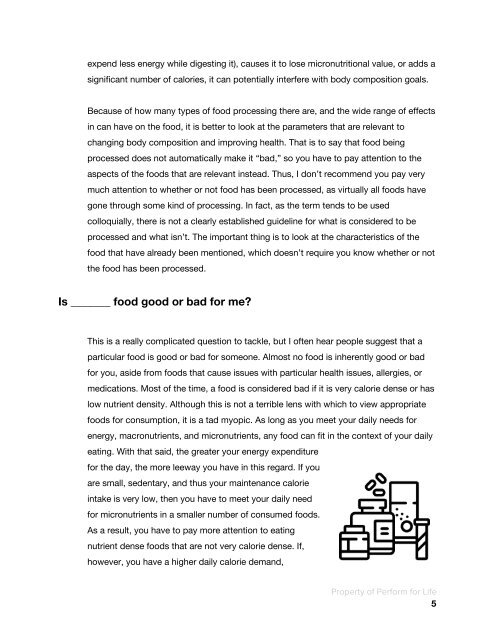Nutrition E-Book
You also want an ePaper? Increase the reach of your titles
YUMPU automatically turns print PDFs into web optimized ePapers that Google loves.
expend less energy while digesting it), causes it to lose micronutritional value, or adds a<br />
significant number of calories, it can potentially interfere with body composition goals.<br />
Because of how many types of food processing there are, and the wide range of effects<br />
in can have on the food, it is better to look at the parameters that are relevant to<br />
changing body composition and improving health. That is to say that food being<br />
processed does not automatically make it “bad,” so you have to pay attention to the<br />
aspects of the foods that are relevant instead. Thus, I don’t recommend you pay very<br />
much attention to whether or not food has been processed, as virtually all foods have<br />
gone through some kind of processing. In fact, as the term tends to be used<br />
colloquially, there is not a clearly established guideline for what is considered to be<br />
processed and what isn’t. The important thing is to look at the characteristics of the<br />
food that have already been mentioned, which doesn’t require you know whether or not<br />
the food has been processed.<br />
Is _______ food good or bad for me?<br />
This is a really complicated question to tackle, but I often hear people suggest that a<br />
particular food is good or bad for someone. Almost no food is inherently good or bad<br />
for you, aside from foods that cause issues with particular health issues, allergies, or<br />
medications. Most of the time, a food is considered bad if it is very calorie dense or has<br />
low nutrient density. Although this is not a terrible lens with which to view appropriate<br />
foods for consumption, it is a tad myopic. As long as you meet your daily needs for<br />
energy, macronutrients, and micronutrients, any food can fit in the context of your daily<br />
eating. With that said, the greater your energy expenditure<br />
for the day, the more leeway you have in this regard. If you<br />
are small, sedentary, and thus your maintenance calorie<br />
intake is very low, then you have to meet your daily need<br />
for micronutrients in a smaller number of consumed foods.<br />
As a result, you have to pay more attention to eating<br />
nutrient dense foods that are not very calorie dense. If,<br />
however, you have a higher daily calorie demand,<br />
Property of Perform for Life<br />
5


